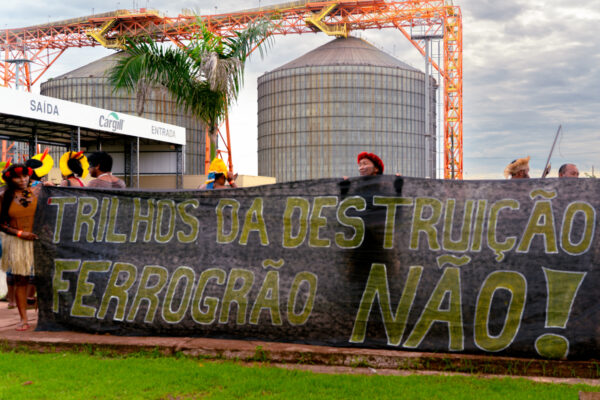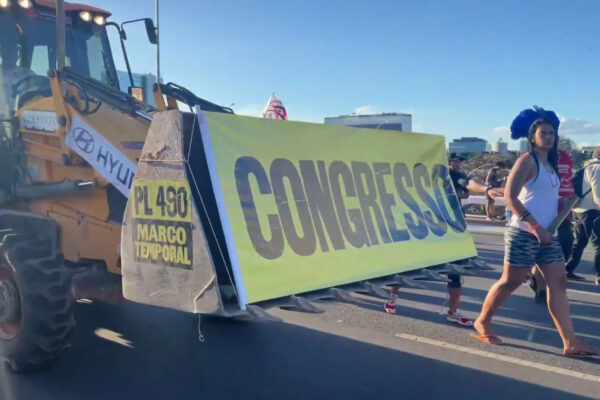
Last June, the Norte Energia (NESA) consortium, charged with building the sprawling Belo Monte dam on Brazil’s Xingu River, was forced to admit to a one-year delay in the project’s construction. NESA is infamous for its criminal neglect of the dire social and environmental impacts of the mega-dam, yet this setback is not simply another stain on its tattered reputation; it could also result in serious fines from Brazil’s energy agency ANEEL for failing to honor contractual requirements to produce electricity by a set date. In turn, these events have spawned new efforts to undercut legal safeguards, marking the latest chapter in a fierce struggle for accountability in the Amazon.
As is standard practice in NESA’s disreputable operations, the consortium was quick to pin the blame for delays on “government actions, acts of God, and force majeure,” alluding to the dozens of lawsuits filed against the project by federal prosecutors (MPF), as well as numerous grassroots actions that have repeatedly paralyzed the project since its initiation. In eschewing its responsibility, the consortium aimed to obscure the illegality of its operations, which inevitably provokes federal lawsuits, as well as its heinous treatment of local communities and dam workers, which has triggered a myriad of protests, occupations, and strikes.
Challenging NESA’s attempts to duck liability for the delays, the MPF recently argued to ANEEL that the consortium was wholly responsible for these setbacks due to the “inertia or failure of the concessionaire to meet its obligations” to mitigate the dam’s severe social and environmental impacts. The MPF cited NESA’s practice of signing agreements with indigenous and riverine communities only to renege on its promises, fueling renewed protests that paralyzed dam construction.
In a ruling last week, ANEEL rejected NESA’s arguments, contending that the consortium did not contemplate an “adequate strategy to minimize the impacts and [financial] losses” of the project within the dam’s official construction timeline. Based on ANEEL’s analysis of its poor management, NESA could be held financially responsible for delays and forced to furnish electricity to Brazil’s grid from the costly short-term (spot) energy market.
While this surprising decision suggests a rare taste of justice on Belo Monte, a sinister process is unfolding in Brazil’s halls of power, seeking to leverage the project’s setbacks as an opportunity to attack the fundamental checks and balances meant to limit environmental and human rights abuses.
Brazil’s Environmental Minister Isabel Teixeira recently claimed that Belo Monte’s delays justify the “simplification” of the environmental licensing process, potentially reducing a once rigorous procedure – designed to prevent and mitigate the worst socio-environmental impacts of development projects – to little more than a rubber stamp. This proposed streamlining would also gut the authority of Brazil’s environmental and human rights agencies just in time to ram through the licensing and auction of the polemic São Luis do Tapajós mega-dam this year, bending to the electricity sector’s timetable. Minister Teixeira’s statement illustrates the inordinate influence that the country’s energy planners and their corporate rulers wield over environmental concerns.
Writing in a blog for the Brazil’s Socio-Environmental Institute (ISA), the lawyers Biviany Rojas and Leonardo Amorim decry that the Brazilian electricity sector and federal government routinely blame Belo Monte’s delays on the institutions behind the country’s environmental licensing process. They call on civil society to roundly reject such reasoning given that these institutions are in fact working to insure respect for human rights and environmental protection.
“Used to blaming all of the problems and postponements of project developers on [the environmental agency] IBAMA and [indigenous agency] FUNAI, developers tend to hide their own technical incompetence behind alleged delays in environmental licensing,” argue the ISA analysts.
From its inception, the Belo Monte dam has exhibited alarming rates of illegality, corruption and impunity. NESA has enjoyed carte blanche privileges, bestowed by powerful forces within the Brazilian government, essentially allowing the consortium to operate above the law. This cozy relationship profoundly undermines environmental and human rights standards in the Amazon, setting a grim paradigm for future projects of its kind.
The dam’s approval extensively subverted Brazil’s environmental and human rights legislation, allowing licensing to be fast tracked in 2010 despite a myriad of irregularities. The few barriers to project implementation – represented by “conditionalities” mandated by IBAMA on the dam’s environmental license – have been almost entirely ignored by NESA. This neglect has in turn provoked social and environmental chaos on the Xingu, motivating federal lawsuits and the ire of local communities. The significant construction delays that stem from this chaos are indeed NESA’s direct liability, not the consequence of unreasonable demands for justice.
Summing up this situation, Rojas and Amorim argue, “In reality, what is becoming ingrained today is a true blackout of our rights and our institutions. The judicialization of conflicts and the occupations of construction sites, which are cited as the reason for [Belo Monte’s] delays, stem from our democratic deficit, from the lack of effective spaces to guarantee rights. In this context, society cannot accept that those meant to ensure rights are penalized when they do their duty.”
While recent setbacks for Belo Monte suggest NESA might finally be held accountable for its deeds, the project’s dark history indicates otherwise. This latest chapter in the mega-dam’s unfolding disaster reveals that the Amazon and its defenders should brace themselves for a new wave of state-sponsored injustice, while preparing themselves to mount new forms of resistance.













